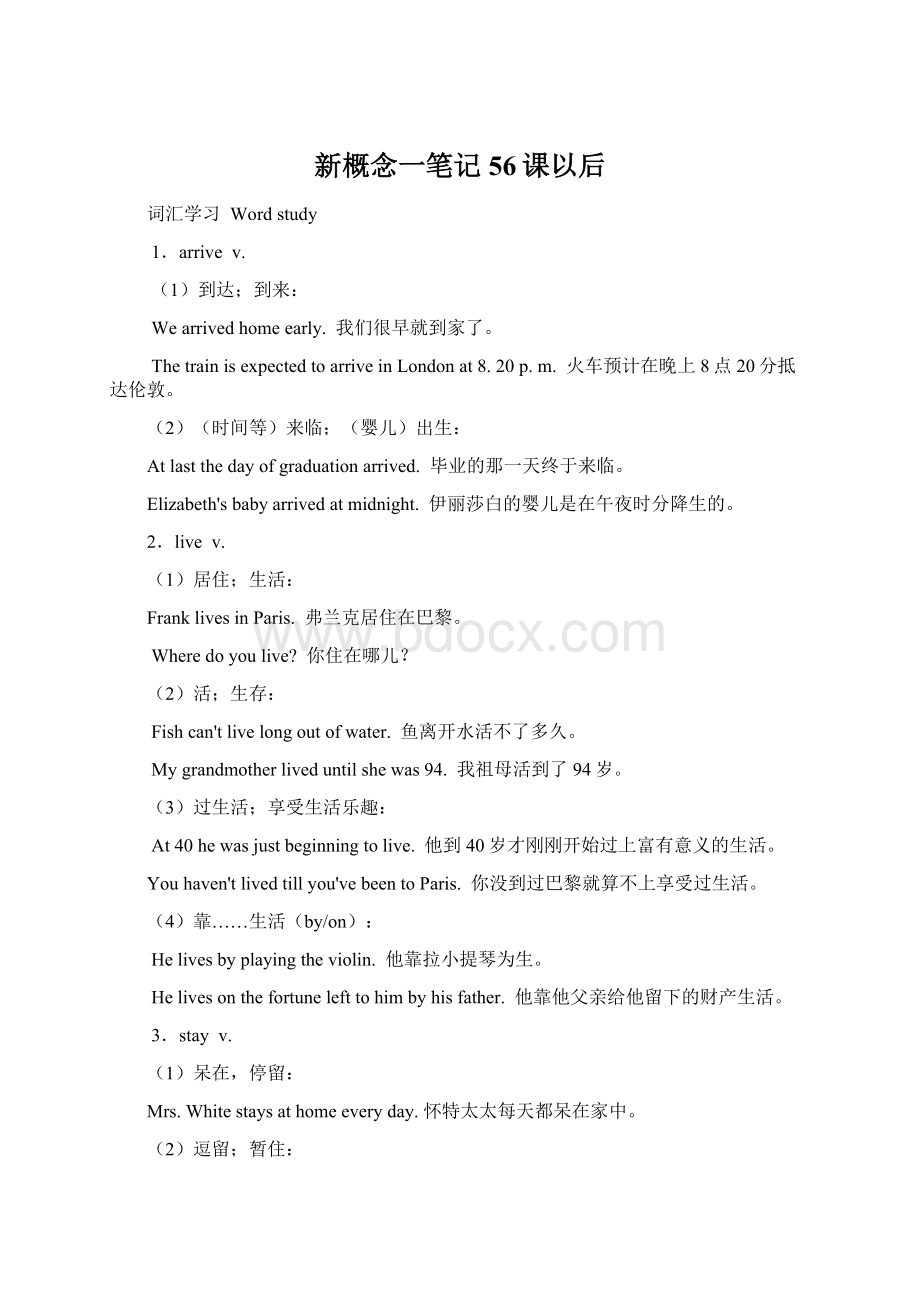新概念一笔记56课以后文档格式.docx
《新概念一笔记56课以后文档格式.docx》由会员分享,可在线阅读,更多相关《新概念一笔记56课以后文档格式.docx(122页珍藏版)》请在冰豆网上搜索。

他到40岁才刚刚开始过上富有意义的生活。
Youhaven'
tlivedtillyou'
vebeentoParis.
你没到过巴黎就算不上享受过生活。
(4)靠……生活(by/on):
Helivesbyplayingtheviolin.
他靠拉小提琴为生。
Helivesonthefortunelefttohimbyhisfather.
他靠他父亲给他留下的财产生活。
3.stay
(1)呆在,停留:
Mrs.Whitestaysathomeeveryday.怀特太太每天都呆在家中。
(2)逗留;
暂住:
Wewerestayingatthesamehotel.
我们住在同一家饭店。
(3)持续;
保留:
Thehousehastostayexactlyasitwas.这所房子必须完全保持原来的样子。
练习答案
Keytowrittenexercises
Lesson56
A
1
Thechildrengotoschoolinthemorning.
2
Theirfathertakesthemtoschool.
3
Mrs.Sawyerstaysathome.
4
Shedoesthehousework.
5
Shealwayseatsherlunchatnoon.
B
Whatdoesshedointhemorning?
Shealwaysmakesthebedinthemorning.
Whatdoeshedointhemorning?
Healwaysshavesinthemorning.
Whatdotheydointheevening?
Theysometimeslistentothestereointheevening.
Whatdoeshedoeveryday?
Healwayscleanstheblackboardeveryday.
Whatdotheydoatnight?
Theyalwaysgotobedearlyatnight.
6
Whatdoesshedoeveryday?
Sheusuallywashesthedisheseveryday.
7
Whatdotheydointheafternoon?
Theyusuallytypesomelettersintheafternoon.
8
Whatdoesitdoeveryday?
Itusuallydrinkssomemilkeveryday.
9
Theysometimeswatchtelevisionintheevening.
10
Whatdoesshedoatnoon?
11
Whatdoeshedointheevening?
Heoftenreadshisnewspaperintheevening.
新概念第一册57-58课文详解及练习答案
课文详注
Furthernotesonthetext
1.bycar,乘汽车。
by(乘坐)表示“乘坐(某种交通工具)”,但它必须与动词连用。
表交通工具的名词前不加冠词:
byboat
乘船
bybus
乘公共汽车
byplane
乘飞机
bysea
2.onfoot,步行。
语法
Grammarinuse
一般现在时与现在进行时
一般现在时表示一般的动作或不断重复发生的动作;
现在进行时表示说话时正在发生的动作,动作还没有完成。
一般现在时表示永久的情况;
进行时表示暂时的情况。
进行时只用于表示动作或偶尔发生的事件(Weareeating,itisraining等等)。
有些动词(如like,want,know等)不是动作动词,因此不能用进行时态,如不能说Iamknowing或Weareliking,而只能说Iknow或Welike。
一般现在时表达某个习惯性动作,通常与时间频度副词连用,如usually,always,often,sometimes,never等;
现在进行时表示此时此刻正在进行的动作,一般与now,atthemoment,today,thisafternoon,thisevening,tonight等连用。
Weusuallywatchtelevisionatnight.Butwearelisteningtothestereotonight.
我们通常晚上看电视。
但是今晚我们正在听立体声节目。
1.play
(1)v.玩,做游戏:
Thechildrenareplayinginthegarden.孩子们正在花园里玩耍。
(2)v.参加(体育活动、比赛等):
Let'
splaychess!
咱们来下棋吧!
Helikesplayingbasketball.
他喜欢打篮球。
(3)n.玩耍;
娱乐:
AllworkandnoplaymakesJackadullboy.只工作而不娱乐会使人变呆的。
2.cook
(1)v.烹调;
煮,烧:
Shecookedalovelymealforherhusband.
她为丈夫做了一顿美餐。
Thebeefisnotcookedenough.牛肉煮得不够熟。
(2)n.厨子,炊事员:
Tomworksasacookinalocalrestaurant.
汤姆在当地的一家餐馆当厨子。
Mydadisreallyagoodcook.
我爸爸烹调手艺特棒。
Lesson58
Sheusuallydrinksteainthemorning,butthismorning,sheisdrinkingcoffee.
Theyusuallyplayinthegardenintheafternoon,butthisafternoon,theyareplayinginthepark.
Heusuallywashesthedishesatnight,buttonightheiswashingclothes.
Whatdoessheusuallydointhemorning?
Sheusuallydrinksteainthemorning.
Whatisshedoingthismorning?
Sheisdrinkingcoffee.
Whatdotheyusuallydointheafternoon?
Theyusuallyplayinthegardenintheafternoon.
Whataretheydoingthisafternoon?
Theyareswimmingintheriver.
Whatdoyouusuallydointheevening?
Iusuallycookamealintheevening.
Whatareyoudoingthisevening?
Iamreadingabookthisevening.
Whatdoyouusuallydoatnight?
Weusuallywatchtelevisionatnight.
Whatareyoudoingtonight?
Wearelisteningtothestereotonight.
新概念第一册59-60课文详解及练习答案
1.writingpaper,信纸。
paper意为“纸”、“纸张”时是不可数名词,一张纸应是asheetofpaper或apieceofpaper。
类似的名词还有:
glue(abottleofglue一瓶胶水);
chalk(abox/pieceofchalk一盒/枝粉笔);
ink(abottleofink一瓶墨水)。
2.Ionlyhavesmallboxes.我只有小盒的。
boxes后省略了ofchalk。
3.Doyouwantone?
您要一盒吗?
one代替onesmallboxofchalk。
4.Whatelsedoyouwant?
您还要什么吗?
Whatelse…?
可以看成是表示疑问的一个句式,意思是“还有什么……吗?
”else常接在疑问代词、不定代词及疑问副词后面,表示“此外”、“别的”、“其他的”。
又如:
WhoelseisfromNewYork?
还有谁是从纽约来的?
Whenelseshallwemeetagain?
什么其他的时间我们再见面?
Whatelsedidhesay?
他还说了些什么?
完全动词have
(1)
完全动词have的意思相当于“拥有”、“具有”,have当“拥有”讲时,可用于所有的一般时态,却不能用于进行时态(ishaving,arehaving等)。
1.change
n.
(1)找头;
零钱:
Hereisyourchange.这是你的零头。
Ihavenochangeaboutme.我身边没有零钱。
(2)变化;
转换:
Roastbeefisawelcomechangefromtheusualtastelessfood.烤牛肉与平素无味的饭菜比起来实在是一种让人欣喜的变化。
sgotoaFrenchrestaurantforachange.咱们去家法国餐馆吧,换换口味。
2.size
(1)(衣服、鞋、帽等的)尺码,号:
Whatsizedoesshewant?
她想要几号的?
Thisblouseisyoursize.这件衬衣是你这号尺码的。
(2)(尺寸、体积、规模、身材等的)大小;
(数量)多少:
Therearehousesofallsizesinthattown.那个镇上有着大大小小各式房子。
Wehavechosensomeboysallofthesamesize.
我们选出了一些个头一般高的男孩子。
Lesson60
Idon'
thaveanygrapes,butIhavesomepeaches.
thaveanytomatoes,butIhavesomepotatoes.
thaveanymince,butIhavesomesteak.
thaveanyglue,butIhavesomeink.
thaveanyenvelopes,butIhavesomewritingpaper.
thaveanyhoney,butIhavesomejam.
PennyandIdon'
thaveanybeans,butwehavesomepotatoes.
PennyandSamdon'
thaveanywine,buttheyhavesomebeer.
SamandIdon'
thaveanybread,butwehavesomebiscuits.
SamandPennydon'
thaveanygrapes,buttheyhavesomebananas.
Thechildrendon'
thaveanybutter,buttheyhavesomeeggs.
thaveanylettuces,butIhavesomecabbages.
thaveanybeans,butwehavesomepeas.
新概念第一册61-62课文详解及练习答案
1.fellill,感觉病了;
lookill,看起来有病。
前者指自我感觉,后者指外表形象。
ill是表语,look和feel都是系动词,可像am/is/are那样,后面跟形容词。
2.…sohemuststayinbedforaweek.……因此他必须卧床休息一周。
so表示“因此”、“所以”。
for可以引出一段时间,表示某个动作持续多少时间。
fortwohourseachday每天两小时
3.That'
sgoodnewsforJimmy.对吉米来说,这可是个好消息。
句中的news是不可数名词,不是复数形式。
在英语中,有些以-s结尾的名词可作单数使用,又如:
mumps(腮腺炎),measles(麻疹)。
4.Shehasaheadache.她头疼。
根据现代英语习惯,headache前常用不定冠词a。
其他ache型的复合词也多用不定冠词,如:
anearache(耳疼),atoothache(牙疼),astomachache(胃疼)。
5.take/haveanaspirin,服/吃一片阿司匹林。
6.haveatemperature,发烧。
=haveafever.
She
hasahighfever.
她在发高烧。
1.完全动词have
(2)
have(和havegot)常与表示疼痛和疾病的名词连用。
关于与这种名词连用的不定冠词a/an的用法可有几种情况:
(1)必须用不定冠词,如acold(感冒),aheadache(头疼),asorethroat(嗓子疼):
Ihaveaheadache/cold.
我头疼/感冒了。
(2)不定冠词可用可不用,如catch(a)cold(患感冒),have(a)backache/stomachache/toothache(患背痛/胃痛/牙疼等):
I'
vehad(a)toothacheallnight.
我牙疼了一整夜。
(3)复数形式的疾病名称前面不用冠词。
如measles(麻疹),mumps(流行性腮腺炎),shingles(带状疱疹):
Mostchildrenareinbedwithmumps.
大多数孩子们都得了流行性腮腺炎,躺在床上。
(4)被认为不可数的疾病名称前面不用冠词,如flu(流行性感冒),gout(痛风),hepatitis(肝炎)等:
Iwasinbedwithflufortendays.
我因患流感,卧床10天。
the也可以与flu,measles和mumps等词连用,如:
He'
sgottheflu/themeasles/themumps.
他得了流感/麻疹/腮腺炎。
2.must
(2)
must是情态助动词(如can一样),它本身没有时态、性或数的变化,也不能单独作谓语动词(简短回答除外)。
must表示“必要性”,即某人必须做某事。
(请参见Lessons29~30语法部分。
)
1.feel
(1)觉得;
感到;
意识到:
Icouldfeelrainonmyface.
她感觉到雨点打在我的脸上。
sfeelingalittlebettertoday.
他今天感觉好点了。
(2)摸,触;
(客体)给人某种感觉:
Hefelthispocketsandthentookoutasmallbox.
他摸摸他的口袋,然后取出一个小盒子。
Thesilkfeelsverysmooth.
丝绸摸上去很滑爽。
(3)认为;
以为;
相信:
Ifeelthathehasmadeamistake.
我认为他犯了一个错误。
Ifeelitunnecessarytodoso.
我认为这样做没必要。
2.remember
(1)记得;
回忆:
CanMrs.Williamsrememberthedoctor'
stelephonenumber?
威廉斯太太记得起医生的电话号码吗?
Irememberheusedtodressinabluesuit.
我记得他从前常穿一套蓝色衣服。
(2)记住;
牢记;
不忘记:
ItriedhardtorememberthelongpassageofShakespeare.
我努力记住莎士比亚的大段说白。
Rememberyourappointmentwiththedentist.
别忘了你和牙医的预约。
Lesson62
Hehasacold.
Hecan'
tgotowork.
Heisnotwell.
Hefeelsill.
Hemustseeadoctor.
Hedoesnotlikedoctors.
What'
sthematterwithElizabeth?
Doesshehaveanearache?
No,shedoesn'
thaveanearache.
Shehasaheadache.
Soshemusttakeanaspirin.
sthematterwithGeorge?
Doeshehaveaheadache?
No,hedoesn'
thaveaheadache.
Hehasanearache.
Sohemustseeadoctor.
sthematterwithJim?
Doeshehaveastomachache?
thaveastomachache.
Hehasatoothache.
Sohemustseeadentist.
sthematterwithJane?
Doesshehaveatoothache?
thaveatoothache.
Shehasastomachache.
Soshemusttakesomemedicine.
sthematterwithSam?
Hehasatemperature.
Sohemustgotobed.
sthematterwithDave?
Hehasflu.
Sohemuststayinbed.
sthematterwithJimmy?
Hehasmeasles.
Sowemustcallthedoctor.
sthematterwithSusan?
Shehasmumps.
Sowemustcallthedoctor.
新概念第一册63-64课文详解及练习答案
1.playwith,玩……